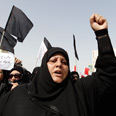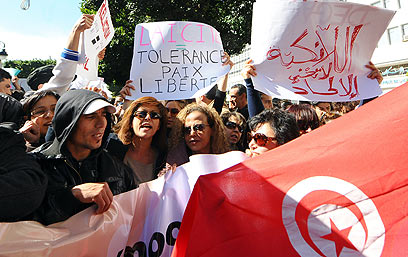
Anti-Islamist protest in Tunisia
Arab world unrest reaches Horn of Africa. In Djibouti, one policeman killed in clashes, one demonstrator run over. Some 15,000 protest against Islamist Movement in Tunisia following assassination of Polish priest, verbal attacks against Jews. Tear gas fired at protestors in Kuwait, Bahrain. Egypt announces lifting of emergency laws within six months
After upheavals in Egypt and Tunisia and uprisings throughout the Arab world, unrest has reached former French colony Djibouti where two people were killed in clashes on Saturday. In Tunisia, some 15,000 protestors took to the streets to demonstrate against the Islamist Movement after a Polish priest was assassinated by an extremist group. The Crown Prince in Bahrain called for a national day of mourning.
Meanwhile, an Egyptian official announced Cairo will lift its emergency laws within six months. Cancellation of the state of emergency was one of the main demands of protesters who toppled Hosni Mubarak from power.
Djibouti detained three leading opposition politicians on Saturday, its chief prosecutor said, in a move to quash opposition protests triggered by a wave of political unrest sweeping through the Middle East.
Earlier, anti-government demonstrators clashed for a second day with riot police who used teargas to disperse the crowds demanding the tiny Horn of Africa state's president step down, buoyed by events in Egypt and Tunisia.
Witnesses said Saturday's demonstrations in Djibouti's Balala suburb failed to match the intensity of Friday's when at least two people were killed after security forces moved in at dusk to end an authorized demonstration in the city centre.
Interior Minister Yacin Elmi Bouh said one policeman was killed in the fighting and one demonstrator died after being hit by a speeding police car.
The former French colony, whose port is used by foreign navies patrolling busy shipping lanes in the Gulf of Aden to fight piracy, counts Somalia and Eritrea among others as neighbors.
One self-exiled presidential challenger, Abdourahman Boreh, who plans to boycott April's election if Guelleh stands, said the United States was backing Djibouti's leader for strategic reasons. But that strategy had backfired, he said.
Tunisians protest against Islamists
About 18,000 people clogged the main avenue of Tunis on Saturday, many protesting against Islamists, following more than two weeks of calm in the North African country's capital.
Tunisia's former president Zine al-Abidine Ben Ali was ousted in January after a wave of demonstrations, sending shockwaves through the rest of the Arab world.
As many as 15,000 of the demonstrators on Saturday were protesting against Tunisia's Islamist movement, calling for religious tolerance a day after the Interior Ministry announced a Polish priest had been assassinated by an extremist group and following verbal attacks on Jews.
"We need to live together and be tolerant of each other's views," said Ridha Ghozzi, 34, who was among the protesters carrying signs and chanting slogans including "Terrorism is not Tunisian," "Religion is Personal" and "Muslims, Christians, and Jews - we're all Tunisians." 
Tunisians back on the streets (Photo: AFP)
Another 3,000 protesters gathered around the French embassy building nearby, calling for the removal of the French ambassador - a target of local media coverage after being curt with reporters from the state broadcaster.
Several hundred other protesters were calling for the replacement of Tunisia's transitional government, charged with preparing elections to replace Ben Ali.
Bahrain: Day of mourning announced
Thousands of singing and dancing protesters streamed back into Manama's central Pearl Square Saturday after Bahrain's leaders withdrew tanks and riot police following two straight days of a bloody crackdown by security forces in the tiny monarchy.
The Bahraini royal family, which was quick to use force earlier this week against demonstrators in the landmark square that has been the heart of the anti-government demonstrations, appeared to back away from further confrontation following international pressure from the West.
Crown Prince Salman bin Hamad Al Khalifa, deputy supreme commander of the armed forces, appealed for calm and political dialogue in a brief address on state TV and called for a national day of mourning "for the sons we have lost," the state news agency reported.
"I stress, once more, that our duty is to preserve security and stability, to ensure that there is no discord and that the situation does not worsen," the statement on Bahrain's national news agency said. He earlier ordered the withdrawal of all military from the streets of Bahrain with immediate effect.

Demonstrators in Tunisia (Photo: AFP)
Kuwaiti police fired tear gas at 300 stateless Arabs demanding citizenship at a protest in a village outside Kuwait City on Saturday, a human rights activist said.
Maha al-Barjas, of the Kuwaiti Human Rights Society, said seven people had been wounded in the clashes.
In Libya, Moammar Gadhafi's forces fired on mourners leaving a funeral for protesters Saturday in the eastern city of Benghazi, killing at least 15 people and wounding scores more as the regime tried to squelch calls for an end to the ruler's 42-year grip on power.
Snipers fired on thousands of people gathered in Benghazi, a focal point of the unrest, to mourn 35 protesters who were shot on Friday, a hospital official said.
A hospital official said 15 people were killed, including one man who was apparently hit in the head with an anti-aircraft missile. The weapons apparently were used to intimidate the population.
Associated Press, Reuters and AFP contributed to this report
- Follow Ynetnews on Facebook










